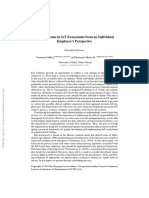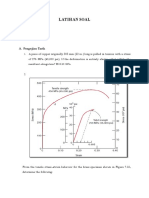Case Study #1
The Transforming Power of Information Technology
Information technology plays a revolutionary role in the case study, fundamentally
altering the methods used for pet identification, tracking, and health monitoring. The system that
Joe and Jennifer created successfully disrupts the current quo by using microchips to improve pet
management, which is what IT does. This inserted microchip of Joe's was a more traditional
method of pet identification, even holding the vital details required to identify an animal: the
owner and medical history of the pet. This helps reunite lost pets with their owners or
streamlines pet owners' communications with veterinarians. Joe's technique was originally more
appealing since it was simpler, satisfied a need without much discussion, complied with local
laws, and encouraged ethical pet care. Her programmable, external microchip adds dynamic,
real-time location monitoring and configurable data access to the original idea, while also
offering password security and GPS tracking. Insurance firms looking to reduce risks find this
useful since it not only helps find missing dogs but also helps track their health more thoroughly.
Jennifer's invention shows how layers of data analytics, customization, and interaction can
transform even seemingly simple operations like pet identification using IT.
It might be challenging to see the transformative potential of IT since doing so means
looking beyond the applications of today and envisioning the future of technology. The
implantation microchip quickly gains popularity among veterinarians and animal owners, but Joe
is unable to keep up with demand as he cannot manufacture and market the device on his own
(Brown, et al., 2013). Joe, for example, didn't understand how adding data accessibility,
security, and GPS capabilities would advance the technology; instead, he was more concerned
with the short-term advantages of his microchip. This draws attention to a prevalent issue: a lot
�of entrepreneurs concentrate on finding solutions for immediate issues rather than thoroughly
investigating how their technology may fit into larger systems or evolve to meet new demands.
Sometimes the technology's gradual nature and early emphasis on specific applications mask its
transformational potential. Joe's microchip, for instance, may not be immediately evident, but it
has wider implications for pet care and the possibility for future improvements. Joe's microchip
was designed to be used only for identification at first. The rapid pace of technological
advancement, which makes it impossible to predict how current technologies may alter or be
replaced by more inventive ones, is another factor contributing to undervaluation.
Legal and Ethical Issues of Electronic Information
The carrying of electronic data in pet microchips is a consequence of considerable legal
and ethical effects. In regard to ownership rights, security, and data privacy, enormous ethical
and legal questions surround the case of electronic data. Since Joe and Jennifer's products collect
sensitive information such as owner contact details and medical records on animals, this must be
protected against abuse or illegal access. Even more critical will be its GPS monitoring
capabilities and even the potential to change the information stored in the microchip that is to be
implanted inside Jennifer, not to speak of the serious privacy concerns that such a feature
introduces. The ability to track the whereabouts of a pet raises considerations about the bounds
of personal privacy as well as the possibility of abuse of that information. Put differently, while it
really does help find lost dogs, it opens up avenues that might be unwanted for tracking or
surveillance, thus raising a number of major ethical questions about consent and the protection of
data.
Ownership and control of data provide significant moral and legal challenges. The
intricacy of concerns surrounding who owns and has management authority over digital data is
�the root cause of many legal disputes that occur between people, corporations, and nations.
Security is a crucial area that involves ethical and legal considerations ( Krotov and Johnson
2023). It is important to remember that, according to the law, businesses must safeguard client
information against intrusions and alert the appropriate persons in the event that one occurs.
Since Jennifer's product allows for data monetization and GPS location monitoring, it further
complicates things. Questioning permission and the extent to which a pet owner's personal
information, even that which is only loosely connected, can be shared or sold are ethical
concerns raised by the practice of tracking a pet's whereabouts. The monetization of private
details without express owner approval, for instance, presents ethical concerns, as demonstrated
by Jennifer's thought of selling pet data to marketers. This issue reflects current discussions
about data privacy and rights of customers, and it is consistent with larger problems in IT where
user data can be used for commercial advantage.
Pet insurance firms face ethical and legal issues when they utilize microchip data to set
policy premiums and coverage limitations. Privacy rules and regulations must be followed while
collecting and using sensitive data, such as health information. Additionally, there's a chance the
data will be sold to outside parties, raising questions around data security and the monetization of
private data. In addition, there are legal issues with classifying the microchip as ownership proof
for Jennifer's merchandise (Brown et. al. 2013).. In the event that the chip's unique number is
accepted as proof of ownership, disagreements over who is actually the pet's owner may surface
in court, making custody proceedings more difficult. Her involvement with privacy regulations
also demonstrates a proactive attitude to negotiating the changing legal environment of data
rights, which is essential to preserving the integrity of technology and customer confidence.
� References
Brown, G.D., et. al. (2013). Health Informatics: A Systems Perspective. Chicago: Health
Administration Press.
Krotov, V., & Johnson, L. (2023). Big web data: Challenges related to data, technology, legality,
and ethics. Business Horizons, 66(4), 481-491.
https://www.sciencedirect.com/science/article/abs/pii/S0007681322001252









































































































